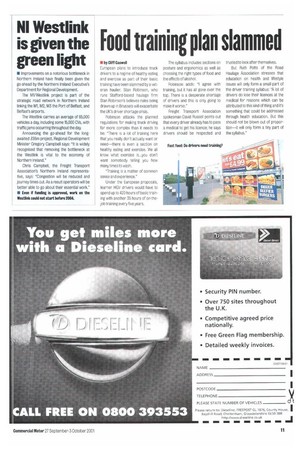Food training plan slammed
Page 11

If you've noticed an error in this article please click here to report it so we can fix it.
• by Cliff Caswell European plans to introduce truck drivers to a regime of healthy eating and exercise as part of their basic training have been slammed by a veteran haulier. Stan Robinson, who runs Stafford-based haulage firm Stan Robinson's believes rules being drawn up in Brussels will exacerbate the UK's driver shortage crisis.
Robinson attacks the planned regulations for making truck driving far more complex than it needs to be: "There is a lot of training here that you really don't actually want or need—there is even a section on healthy eating and exercise. We all know what exercise is...you don't want somebody telling you how many times to wash.
"Training is a matter of common sense and experience.'
Under the European proposals, learner HGV drivers would have to spend up to 420 hours of basic training with another 35 hours of on-thejob training every five years.
The syllabus includes sections on posture and ergonomics as well as choosing the right types of food and the effects of alcohol.
Robinson adds: "I agree with training, but it has all gone over the top. There is a desperate shortage of drivers and this is only going to make it worse."
Freight Transport Association spokesman David Russell points out that every driver already has to pass a medical to get his licence; he says drivers should be respected and trusted to look after themselves.
But Ruth Potts of the Road Haulage Association stresses that education on health and lifestyle issues will only form a small part of the driver training syllabus: "A lot of drivers do lose their licences at the medical for reasons which can be attributed to this kind of thing and it's something that could be addressed through health education. But this should not be blown out of proportion—it will only form a tiny part of the syllabus."




































































































































